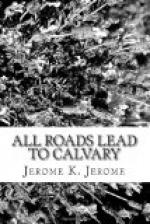Sometimes they agreed it was the newspapers that made war—that fanned every trivial difference into a vital question of national honour—that, whenever there was any fear of peace, re-stoked the fires of hatred with their never-failing stories of atrocities. At other times they decided it was the capitalists, the traders, scenting profit for themselves. Some held it was the politicians, dreaming of going down to history as Richelieus or as Bismarcks. A popular theory was that cause for war was always discovered by the ruling classes whenever there seemed danger that the workers were getting out of hand. In war, you put the common people back in their place, revived in them the habits of submission and obedience. Napoleon the Little, it was argued, had started the war of 1870 with that idea. Russia had welcomed the present war as an answer to the Revolution that was threatening Czardom. Others contended it was the great munition industries, aided by the military party, the officers impatient for opportunities of advancement, the strategists eager to put their theories to the test. A few of the more philosophical shrugged their shoulders. It was the thing itself that sooner or later was bound to go off of its own accord. Half every country’s energy, half every country’s time and money was spent in piling up explosives. In every country envy and hatred of every other country was preached as a religion. They called it patriotism. Sooner or later the spark fell.
A wizened little man had been listening to it all one day. He had a curiously rat-like face, with round, red, twinkling eyes, and a long, pointed nose that twitched as he talked.
“I’ll tell you who makes all the wars,” he said. “It’s you and me, my dears: we make the wars. We love them. That’s why we open our mouths and swallow all the twaddle that the papers give us; and cheer the fine, black-coated gentlemen when they tell us it’s our sacred duty to kill Germans, or Italians, or Russians, or anybody else. We are just crazy to kill something: it doesn’t matter what. If it’s to be Germans, we shout ‘A Berlin!’; and if it’s to be Russians we cheer for Liberty. I was in Paris at the time of the Fashoda trouble. How we hissed the English in the cafes! And how they glared back at us! They were just as eager to kill us. Who makes a dog fight? Why, the dog. Anybody can do it. Who could make us fight each other, if we didn’t want to? Not all the king’s horses and all the King’s men. No, my dears, it’s we make the wars. You and me, my dears.”
There came a day in early spring. All night long the guns had never ceased. It sounded like the tireless barking of ten thousand giant dogs. Behind the hills, the whole horizon, like a fiery circle, was ringed with flashing light. Shapeless forms, bent beneath burdens, passed in endless procession through the village. Masses of rushing men swept like shadowy phantoms through the fitfully-illumined darkness. Beneath that everlasting barking, Joan would hear, now the piercing wail of a child; now a clap of thunder that for the moment would drown all other sounds, followed by a faint, low, rumbling crash, like the shooting of coals into a cellar. The wounded on their beds lay with wide-open, terrified eyes, moving feverishly from side to side.




